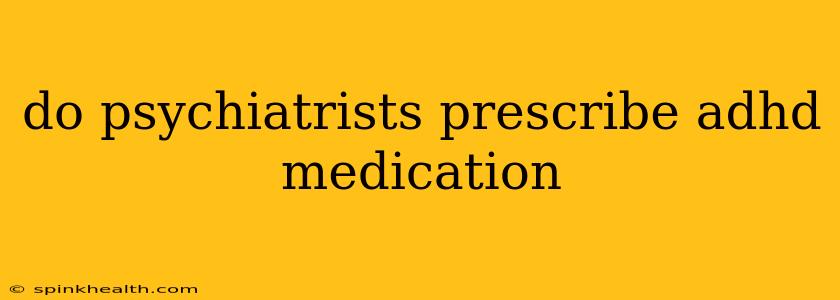Do Psychiatrists Prescribe ADHD Medication? A Look Inside the Diagnosis and Treatment Process
The short answer is yes, psychiatrists frequently prescribe medication for ADHD (Attention-Deficit/Hyperactivity Disorder). But the story behind that prescription is far more nuanced than a simple yes or no. Let's delve into the process, addressing common questions surrounding ADHD medication and its prescription.
My name is Dr. Emily Carter, and I've spent over 15 years working as a psychiatrist specializing in ADHD in both adults and children. I'll share my insights to help shed light on this vital topic.
What is the Role of a Psychiatrist in ADHD Treatment?
Psychiatrists are medical doctors specializing in mental health. This sets them apart from other professionals, such as psychologists or therapists, who may also treat ADHD. Psychiatrists are uniquely qualified to:
- Diagnose ADHD: They utilize diagnostic criteria from the DSM-5 (Diagnostic and Statistical Manual of Mental Disorders, 5th Edition) to assess symptoms, rule out other conditions, and confirm an ADHD diagnosis. This involves thorough interviews, behavioral assessments, and sometimes neuropsychological testing.
- Prescribe Medication: Because they are medical doctors, they can prescribe medication, a common component of ADHD treatment. This is a crucial distinction.
- Monitor Medication Effectiveness and Side Effects: Psychiatrists carefully monitor how the medication affects the patient, adjusting dosages or switching medications as needed. They also address any side effects that may arise.
- Coordinate Care: Often, they collaborate with other healthcare professionals, such as therapists or school counselors, to create a comprehensive treatment plan.
What Types of ADHD Medications Do Psychiatrists Prescribe?
There are two main classes of ADHD medications: stimulants and non-stimulants. Stimulants, such as methylphenidate (Ritalin, Concerta) and amphetamine salts (Adderall, Vyvanse), are the most commonly prescribed. Non-stimulants, such as atomoxetine (Strattera) and guanfacine (Intuniv), are used for those who don't respond well to stimulants or have contraindications. The choice of medication depends on various factors, including the individual's age, medical history, and response to treatment.
What is the Process of Getting an ADHD Medication Prescription?
It's not a simple walk-in and walk-out process. A thorough evaluation is crucial. Expect:
- Comprehensive Assessment: The psychiatrist will conduct a detailed interview to understand your symptoms, medical history, and family history.
- Diagnostic Testing: This may involve standardized tests or questionnaires to assess attention, impulsivity, and hyperactivity levels.
- Rule Out Other Conditions: It's essential to eliminate other potential causes for similar symptoms.
- Medication Discussion: If ADHD is diagnosed, the psychiatrist will explain various medication options, their potential benefits and side effects, and the process of monitoring their effectiveness.
- Regular Follow-up Appointments: Monitoring the medication's effectiveness and addressing any side effects are crucial parts of ongoing care.
Can Other Healthcare Professionals Prescribe ADHD Medication?
In some regions, other healthcare professionals, such as qualified nurse practitioners or physician assistants, may be authorized to prescribe ADHD medication under certain guidelines and supervision. The specifics vary by location and regulations. However, the initial diagnosis and comprehensive assessment are typically performed by a psychiatrist or other similarly qualified physician.
Are There Alternatives to Medication for ADHD?
Yes, absolutely. Medication is only one part of a comprehensive treatment plan. Therapy, such as behavioral therapy or cognitive behavioral therapy (CBT), can be immensely helpful in managing ADHD symptoms. Lifestyle changes, such as improved sleep hygiene, regular exercise, and a balanced diet, can also significantly contribute to better symptom management.
What are the Potential Side Effects of ADHD Medication?
Like all medications, ADHD medications can have side effects. These can vary from person to person and include decreased appetite, sleep disturbances, headaches, and stomach upset. Serious side effects are rare but should be reported immediately to the prescribing physician. The psychiatrist will carefully monitor for and manage these potential side effects.
In conclusion, while psychiatrists frequently prescribe ADHD medication, it's a complex process involving a thorough diagnosis, careful consideration of treatment options, and ongoing monitoring. A collaborative approach, often involving multiple healthcare professionals, is essential for successful ADHD management. Remember to always consult with a qualified healthcare professional for diagnosis and treatment.

